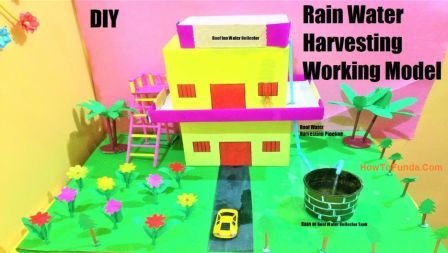Introduction:
The rainwater harvesting project focuses on implementing a sustainable solution to address water scarcity in agricultural practices. By designing a rainwater harvesting system integrated with drip irrigation, we aim to showcase an innovative approach that conserves water, enhances crop yield, and promotes eco-friendly farming practices.

Project Objectives:
- Rainwater Collection: Develop a rainwater collection system to harness rainwater from rooftops and surfaces.
- Filtration and Purification: Design a filtration system to remove debris and contaminants from collected rainwater.
- Drip Irrigation Integration: Implement a drip irrigation system that efficiently delivers harvested rainwater to plant roots.
- Resource Efficiency: Demonstrate how rainwater harvesting and drip irrigation work in synergy to reduce water consumption while improving agricultural productivity.
Methodology:
- Rainwater Collection System:
- Install gutters and downspouts to channel rainwater from the roof into a collection tank.
- Employ a large plastic container as the rainwater collection tank.
- Filtration and Purification:
- Attach a mesh filter at the tank’s inlet to prevent debris and leaves from entering.
- Incorporate a filtration mechanism with layers of sand, gravel, and pebbles to purify the collected rainwater.
- Drip Irrigation System:
- Utilize PVC pipes and connectors to lay out the drip irrigation network.
- Position drip emitters at regular intervals along the pipes.
- Integrate a water pump inside the rainwater collection tank to propel water through the irrigation system.
- Model Demonstration:
- Activate the water pump to showcase the flow of harvested rainwater from the collection tank to the drip irrigation system.
- Observe how the drip emitters provide precise and controlled water delivery to plant roots, minimizing water wastage.
Results and Impact:
- Reduced reliance on traditional water sources for irrigation.
- Efficient use of rainwater for agriculture, lowering water costs.
- Enhanced crop growth and yield due to consistent and targeted water supply.
- Demonstrates an eco-friendly approach to water conservation and sustainable farming.
Innovation and Creativity:
- Integration of rainwater harvesting and drip irrigation technologies for a comprehensive solution.
- DIY approach using locally available materials highlights the feasibility for rural and urban farmers.
Future Applications:
- Adoption of the model by farmers for water-efficient agricultural practices.
- Scaling up the system for larger farming operations and community initiatives.
Conclusion:
The rainwater harvesting and drip irrigation project exemplifies an innovative solution to the pressing challenge of water scarcity in agriculture. By combining rainwater harvesting with efficient irrigation, the project contributes to sustainable agricultural practices, resource conservation, and improved livelihoods for farmers. This model can serve as a blueprint for promoting environmentally responsible agriculture across diverse regions.

